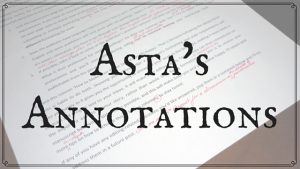
I love historical fiction; however, I’ve encountered the occasional work in which it’s clear the author hasn’t done sufficient research before writing. Anachronisms are the biggest culprit in this regard, so today I thought I’d share four tips on conducting research for your historical novel.
1) Read Contemporary Literature
Assuming your work is set from the Middle Ages onward, you should have no trouble finding texts from that time. Read them to get a feel for the cadence of the language as this will help you achieve a sense of authenticity, in your dialogue in particular, but also in your prose.
2) Verify Your Sources
There are plenty of websites offering historical information, but are they all accurate? An Internet search can be a great way to start your research, but take care over where you place your trust. Ensure it is a reputable source. The same goes for books; although, in general, I would trust a non-fiction text written by a well-known historian over a web page created by a nameless entity.
3) Watch Your Language!
One of the worst areas for slip-ups tends to be dialogue. I’ve seen works in which the author offers careful detail of period clothing and customs, but then ruins all that by having her characters say “okay” or “cool”. I try to keep my writing period appropriate in both dialogue and prose, but at least pay attention to the dialogue. If you are unsure about a word, plug it into the Merriam Webster website as their dictionary definitions usually include a first usage date. If you’re still in doubt and have a reasonable alternative word, use that.
4) Authentic LGBT Portrayal
One issue peculiar to LGBT fiction is the portrayal of LGBT characters in a period setting. It’s important to know how LGBT people were viewed in the country and time in which you’ve set your story. Was homosexuality merely frowned upon, for example, or was it a capital offense? This information is vital so that you know how to show your characters in different situations. Are they living in secret? If so, is that secret absolute or do their inner circle know the truth? Information on these matters can be harder to come by than other aspects of your historical research, but there are some good books out there, and you can also check out Rictor Norton’s excellent online resources.
Does anyone else have any good historical resources to share? If so, do leave a comment!
 Asta’s Annotations is a bi-monthly column in which author and editor Asta Idonea (aka Nicki J. Markus) discusses the world of LGBT publishing and offers tips and tricks to help budding authors.
Asta’s Annotations is a bi-monthly column in which author and editor Asta Idonea (aka Nicki J. Markus) discusses the world of LGBT publishing and offers tips and tricks to help budding authors.
Asta was born in England but now lives in South Australia. She has loved both reading and writing from a young age and is also a keen linguist, having studied several foreign languages.
Asta launched her writing career in 2011 and divides her efforts not only between MM and mainstream works but also between traditional and indie publishing. Her works span the genres, from paranormal to historical and from contemporary to fantasy. It just depends what story and which characters spring into her mind!
As a day job, Asta works as a freelance editor and proofreader, and in her spare time she enjoys music, theatre, cinema, photography, and sketching. She also loves history, folklore and mythology, pen-palling, and travel, all of which have provided plenty of inspiration for her writing. She is never found too far from her much-loved library/music room.
Save



Great tips! Especially the last point. I’ve been frustrated at times reading stories set in other cultures and times where the author made assumptions about the society’s acceptance of homosexuality or homosociality. The tendency is to think, “That society was more conservative or old-fashioned; therefore people would have frowned upon affection between members of the same sex.”
But a lot of conservative societies have/have had high levels of physical affection between members of the same sex. Homosexuality might be frowned upon, but homosociality and physical affection is not. Holding hands, sitting in each other’s laps, kisses on the cheeks—these are read as normal displays of physical affection between friends of the same sex. (In the modern U.S., these are seen as normal among female friends, but not male friends; 150 years or so ago, such displays were common in much of the US among male friends as well.)
In one of these societies, if the “friends” holding hands etc. are actually a romantic couple, no one is the wiser. People see them engaging in typical friendship behavior and don’t label it as sexual or forbidden.
TL;DR: They can hold hands in public, and no one notices.
If people are looking for sources on women with sane-sex interests, that’s the entire purpose of my Lesbian Historic Motif Project. The blog has summaries and discussions of nearly 200 publications to date. Here’s a good introduction. http://alpennia.com/lhmp/about
Another area to be careful of is food. I have seen so called historic novels placed in medieval Europe and ancient Rome which mentioned foods that are New World in origin and could not be found in Europe before 1500 or so at the earliest. Amazing the number of food staples that are of New World origin including turkeys, chocolate, chili peppers, potatoes, tomatoes, some squash and some varieties of the sweet potatoes and nuts. Also tobacco of course and probably other items.
If you’re writing Regency England (my favorite period), you can find the “1785 Dictionary of the Vulgar Tongue” and the 1811 edition online for free. (If you can’t find them, email and I’ll be happy to share.) There’s also Grose’s Classical Dictionary of the Vulgar Tongue, 1823 edition.
The universal calendar site gives you calendars pretty far back for various countries. So I have a set of UK calendars for roughly 1800 to 1830. Besides days of the week, they provide moon phases.
You can find a History of British Weather online which gives you lots of interesting weather details which are useful for historical tales.
A must-have investment if you can spare the $50 is the hardcover “Chambers Slang Dictionary” edited by Jonathon Green. It’s over 1400 pages and covers 500 years of slang in the English-speaking world, with details about origins, earliest use, usage time frames, etc., etc. I would love to have his 3-volume set which is more like an encyclopedia, but that’s currently in the $600 range I think. But given the breadth of the “merely 1400 pages” one, if you have any plans on multiple historical stories, it’d be good to have. And he is indeed an authority on the subject of English slang.
You might also check out the Georgette Heyer site(s) about Regency cant and slang. She is essentially the originator of the modern Regency historical (albeit writing more in the Jane Austen mode and relying on language and wit, as opposed to those who introduced sex into the stories). I suspect some of the slang/cant might have been her own creation, but considering her influence on the genre, whether straight or gay, in my never humble opinion, if GH used it, so can I.
And then there’s also the technique of inventing an alternate history, even a slightly alternate one. If someone tells you, for example, that “gobsmacked” didn’t really come into use until the 1950’s, you can just respond that in your alternate [country] the word came into use in the 1790’s…and who’s going to say you “nay?” *g*
Just some thoughts.
Eric
Thank you for the tips! One of my favorite resources are historical biographies, but literature written at the time can be very helpful, too.
I’d also recommend reading the poetry of the period. Sometimes that will tell you who the people were!
I’m currently writing a series of mysteries set in London in the late 1880s and featuring gay main characters.
I recently wrote an article on my blog which might be of use to writers following this thread, and having just read the tips here, was pleased to see we agreed. I based my post on ‘7 elements of historical fiction’ by M. K. Todd and expanded them with my own ideas and experiences.
The post also links over to The Victorian Dictionary an invaluable resource for anyone writing in that period, or using that period for SteamPunk perhaps, and one of my favourite things there is the dictionary of slang.
Here’s the link to the blog post.
http://jacksonmarsh.com/researching-for-historical-fiction-victorian-london/